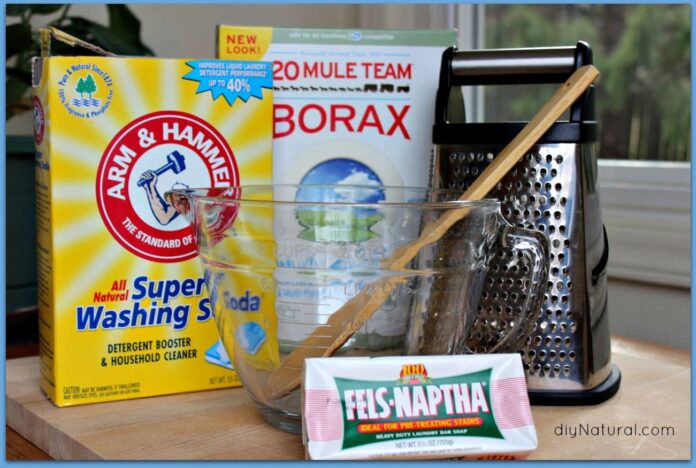Usually, a mixture of baking soda, washing soda, borax, hydrogen peroxide, castile soap, and soap flakes is used to make homemade laundry detergent.
You can control the ingredients when you make your laundry detergent at home, ensuring you know exactly what is being used to wash your clothes and other household items like sheets and towels.
It’s crucial to remember that homemade natural laundry detergent might not work as well as store-bought detergent. It might not be as successful at getting rid of stubborn stains or smells.
The fact that you can control the quantity of scent you use and that homemade laundry detergent doesn’t include dyes, which frequently irritate delicate skin, is one of its advantages.
You can use homemade laundry detergent in high-efficiency and standard washing machines with safety.
Items needed for a natural laundry detergent
1 box grater
1 set measuring cups
1 rubber gloves
1 sealable container (glass or plastic)
1 wooden spoon
1 measuring spoons
1 box Borax
1 box washing soda (sodium carbonate)
1 bar or box of pure bar soap/castile soap or soap flakes
How to make a natural laundry detergent
Follow these simple steps carefully to get your desired laundry detergent make specially by you and naturally as well
- Utilizing a food processor, grate soap bar. Pre-made soap flakes are an additional option.
- In a glass bowl or container, combine all ingredients and whisk thoroughly. To allow for mixing, use a glass or plastic container that is marginally bigger than five cups. Additionally, when combining the ingredients for your washing detergent, wear rubber gloves.
- Utilizing a scoop, store it in a sizable glass jar. To avoid clumping, store the laundry detergent in an airtight container that is kept out of the reach of kids and animals.
- Depending on the size and amount of filth in the wash load, use between two and four teaspoons. Always use the detergent according to the directions on your washing machine
How to Use Homemade Laundry Detergent
Before you load the filthy laundry, add the detergent straight into the washer drum. Because the soap flakes could clump and clog the dispenser, do not use it in an automatic dispenser.
To aid in the mixture’s dissolution, mix one cup of hot water with one spoonful of homemade laundry detergent when washing with your hand. After that, put the detergent/water mixture to a sink filled with either warm or cold water before adding the soiled clothing.
Advantage Of Homemade Laundry Detergent
- It contains fewer hazardous substances and carcinogens.
- You have greater control over the substances and if anybody else in your home has sensitive skin or allergies, you can control it.
- You have greater control over the detergent’s aroma with the addition of essential oils or the maintenance of a clean, odorless base recipe
How to reduce waste and save money when it comes to laundry
- Make the switch to commercial powder detergent: Compared to liquid or pod-style soap, powdered detergent has a longer shelf life and produces less waste from its composition and packaging.
- Employ accurate dosage: One of the most frequent errors people make when doing laundry is using excessive amounts of detergent. Not only is it wasteful, but it also damages the washing machine, your clothes, and your pocket. Try to do precisely to save on laundry expenses.
- Wash in cold water: Using cold water for all of your laundries saves you from using more detergent unless the clothes have hard stain or was used by a sick person.
- Line or air dry: If at all feasible, air or line-dry clothing and household items to avoid the electric dryer and its related energy expenses.
- Instead of using fabric softener, use reusable dryer balls: Use reusable dryer balls instead of dryer sheets and liquid fabric softener to cut costs and waste. By shortening the drying time, dryer balls can save you money in addition to lowering the amount you spend on laundry supplies.
NB: It’s easy to discount the health concerns/risks connected to homemade laundry detergent—after all, what harm can it possibly cause? But we have to understand that laundry detergent has the potential to harbor harmful bacteria, which poses a serious risk to your family’s health.
Apart from the possible health hazards, making homemade laundry detergent could also lead to damage to your washing machine and possibly even void your washer’s warranty if you use non-commercial detergent. “It is important to always check your user manual before using this method.”
Source: www.Muzhchin.net
